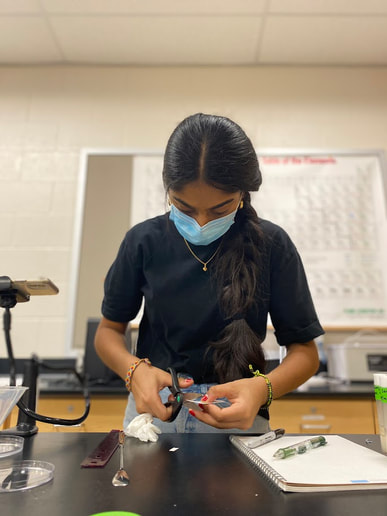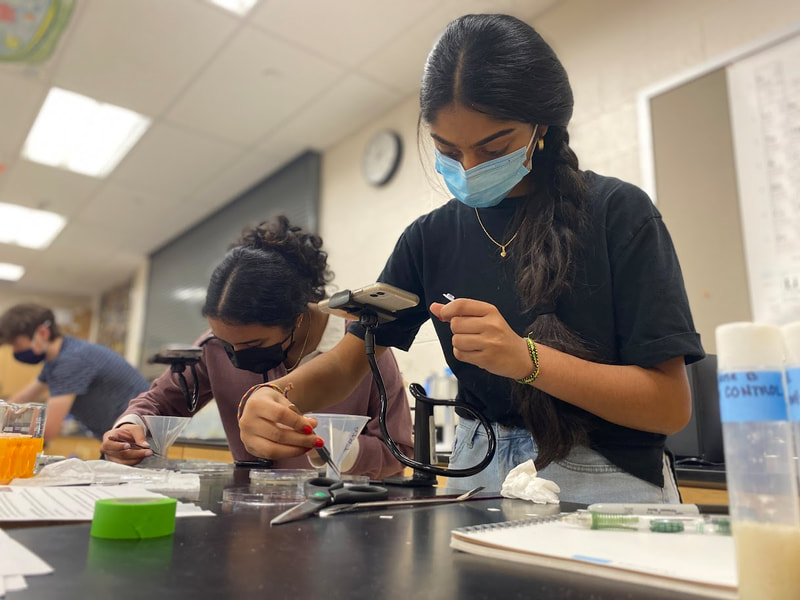|
We’re done already? It seems like just yesterday, we were stepping into the lab for the first time! In my last blog, I talked about how I came up with my research question: How does taking a steady dose of ibuprofen and other common painkillers affect the memory and learning of a developing brain? We have receptors in the brain that regulate learning and memory formation that also process pain killers, like Tylenol and Ibuprofen. As the brain ages and inflammatory responses occur, these receptors start functioning less effectively, contributing to decreases in memory and learning performance. This can cause Alzheimer's disease. There could be potential use of painkillers to prevent or even treat Alzheimer's if they protect these receptors from degenerating. The amazing thing about conducting research is that conclusions lead to more and more questions.  To test the effects on memory and learning on my flies while taking Ibuprofen and Tylenol, I added the daily dose of each drug into their food. After 7 days or continuously taking the daily dose of the painkillers, I tested their memory with the larval memory assay. The first couple of times I ran this assay were incredibly challenging, especially since they involved transferring little larvae from plate to plate every 5 minutes. However, I eventually got the hang of it! My results showed that Ibuprofen increased their memory while Tylenol kept it the same. Based on observations, the larvae that took Ibuprofen also had a quicker recall time, leading me to the conclusion that Ibuprofen can increase short term memory. While I would love to say that my memory should be intact, or even better, because I take Ibuprofen, I found that research does not always lead to one straight answer. The amazing thing about conducting research is that conclusions lead to more and more questions. One question that arose was what are the long term effects on memory with daily painkiller usage? I was only able to test short term memory due to time restraints and knowing the long term effects can be useful to see if it would be feasible to use Ibuprofen or other painkillers to treat or prevent Alzheimer’s. OTC painkillers are also commonly accidentally overtaken, which leads me to question how a higher dose could affect memory. Conducting my own research taught me invaluable things. From managing my time in the lab to fit everything that needed to be done, to compiling and understanding data, to presenting my data, I was learning something new every day. I learned to work with issues rather than against them. Whether it be drowning larvae, losing larvae, denting my plates, or simply counting incorrectly, I learned how to analyze a mistake and bounce back without wasting too much time. Time is essential in the lab and I learnt to take help from my peers or the TAs when I needed it.  Overall, my time at TRIP has been incredibly beneficial. I’ve loved every minute I spent in the lab. When I first started this program, I was unsure about the career path I wanted to go down, and that was actually one of the reasons I wanted to join TRIP. My experience at TRIP has shown me that I absolutely love being in the lab, as well as learning about neurology and psychology. TRIP gave me an opportunity to explore research in an environment that nurtured growth and questioning, and I could not be any more grateful. I want to thank my amazing peers who made the hours at the lab so much fun, the TAs, who always lent a helping hand, and Dr. Leystra and Dr. Purdy, who were amazing mentors and guided me through the entire process!
0 Comments
Your comment will be posted after it is approved.
Leave a Reply. |
Archives
April 2024
Categories
All
|



 RSS Feed
RSS Feed